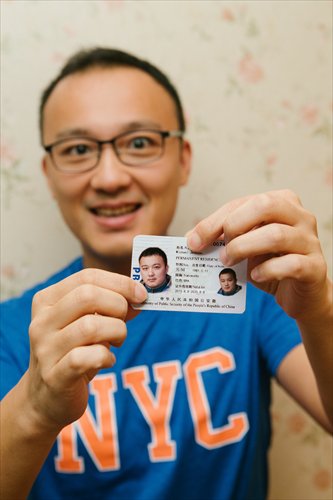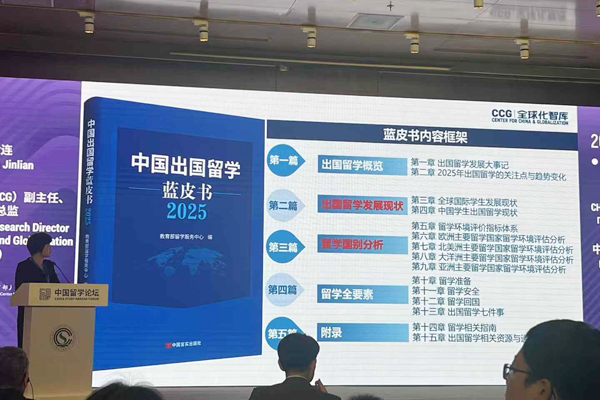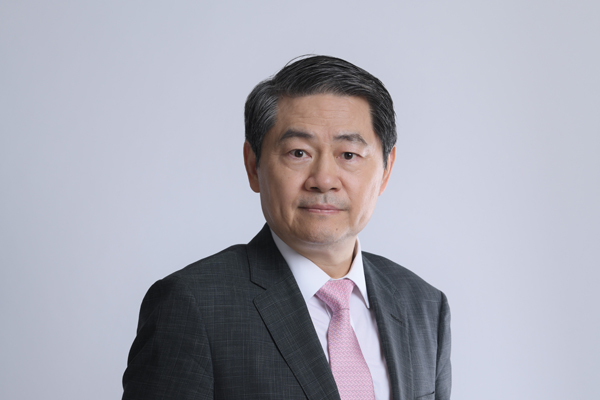【Global Times】Green Lights for Green Cards
2016年8月31日
Overseas Chinese descents and Chinese studying abroad are the focus of China’s strategy to bring in foreign talents. Photo: Li Hao/GT
On the morning of March 1, Huang Ying arrived at the new service center for foreigners applying for permanent residence permits in Beijing’s Zhongguancun, known as China’s Silicon Valley. One hour later, the Chinese American man finished submitting his paperwork for the permit or Chinese green card.
He was informed the permit would be issued in 50 days. "I didn’t think it would be so efficient," Huang told the US China Press, adding when his relatives filed for the permit previously, the wait time was much longer.
Huang, the vice president of Chinese IT giant Lenovo, was among the first group of foreigners working at Zhongguancun who was granted the permanent residence permit, following the implementation of favorable visa policies providing foreign talents easier entry and exit, which took effect on March 1.
As China’s economy continues to develop, the demand for foreign talent that can bring in core technologies and innovation is huge. Among the targeted talents are a large number of waiji huaren – foreign nationals with Chinese ethnicity either born overseas or new immigrants – who are increasingly drawn back to China by the country’s opportunities.

Overseas Chinese account for the majority of the candidates for China’s green card. Photo: IC
The policies
Permanent residency in China, with benefits bestowing long validity, easy entry and exit, more convenient accesses to employment, children’s education, buying a home and investment, is notoriously difficult to acquire.

In 2013, the number of foreign nationals living in China reached 848,500. However, from 2004 when the permanent residency policy was introduced, to 2013, only 7,356 foreigners have obtained the permit, according to Blue Book of Global Talent Annual Report of Chinese International Migration (2015) by think tank Center for China and Globalization (CCG).
The candidates for permanent residency permit in China are narrowed to investors with more than $500,000 invested in China, technical personnel at executive positions in certain organizations, such as companies under State Council departments or provincial-level government, professors at top universities, companies carrying out national projects or other key technology enterprises, high-tech and foreign-invested companies in State-encouraged industries.
Waiji huaren, under the category of family reunion, are provided convenience in visa issues, according to the website of the Overseas Chinese Affairs Office of The State Council. It covers unmarried people under 18 who come to China to live with their parents, elderly above 69 who have direct relatives that are Chinese nationals and spouses of Chinese nationals.
Luckily, Huang’s application fell into the group of waiji huaren who can benefit from the new visa rule in Zhongguancun. Chinese descents who have a doctorate or have worked in a Chinese enterprise for more than four years and who are able to maintain a no less than a six-month stay in China each year, can apply for the Chinese green card directly.
From March to May 20, a total of 83 foreigners have submitted an application for the permanent residence permit at the service center in Zhongguancun, according Zhongguancun Science Park’s website.
Overseas Chinese a main focus
Overseas Chinese descents and Chinese studying abroad are the focus of China’s strategy to bring in foreign talents, said Wang Huiyao, president of CCG, according to a Global Times report in 2015.
"The main goal is not just to bring Chinese workers overseas back to China. However, it’s only natural that the international immigration trend shows that a person is more likely to come back to their ethnic homeland because they have more connections," said Liu Guofu, immigration law professor at the Beijing Institute of Technology.
At the same time, targeted foreign talents, for example, the elites in developed countries, may not be interested in China due to lack of connections within the country, said Liu.
The demand for Chinese permanent residency of waiji huaren is certainly higher compared with foreigners without Chinese heritage or connections.
Globally, to attract the overseas diasporas back to their homeland is common practice of many developing countries. Talent flow from developed countries to developing countries only accounts for 3 percent of the total international talent, Liu said.
For example, India has adopted the PIO (person of Indian origin) card scheme, providing eased visa terms for foreigners with Indian heritage to enter and stay in India.
Reform remains elusive
Ker Zheng, a 26-year-old American-born Chinese who works in an IT company in Beijing, got his work visa last December. In his opinion, a Chinese green card is beneficial to allure overseas Chinese who are crucial to helping Chinese companies expand overseas and grow their businesses.
"Most companies don’t want to pay high global salaries for foreign talents. So, the government needs to find other ways to tempt talented overseas Chinese. A Chinese green card would make things easier," he said.
Nevertheless, Zhongguancun’s relaxed visa policy on overseas Chinese, according to Liu, has its own inappropriate aspects. "[It’s targeted at] doctorate and start-up entrepreneurs. It’s hard enough for Chinese to start up a company, not mention waiji huaren who have lived overseas for decades. It’s risky for them to make the decision to come to China to start up a company," explained Liu.
Meanwhile, people with doctorate degrees are looked after in many countries; China might not be their best choice, he said.
The visa policy should function to gather and affect a much larger group of people, Liu suggested. "For example, many people with a bachelor’s or a master’s degree want to work in China, but they are not well supported."
Zheng agrees. He said the requirements should be eased to cover more white-collar jobs, and also younger people.
"Younger generations will be more energetic and active, but most of us are not interested in marrying a Chinese spouse anytime soon and do not have the ability or desire to invest $500,000 in a local company," he said.
American-born Chinese Mary Peng, founder of Beijing’s International Center for Veterinary Service, has lived in China for the past two decades. As an MBA graduate who runs her own business in China, the Chinese green card is still too far from reach.
Peng first looked into the permanent residency application process 10 years ago and also reviewed the process recently. "It’s not easy for owners of small-medium enterprises (SME) to apply," she said.
As an employment visa holder, Peng has dealt with the complicated visa renewal process from time to time. Last time, she had to resubmit her company’s registration documents and handed in her passport. She was without her passport for over 21 days while her visa was being processed in Beijing; she could not leave the country or conduct banking transactions and other business without her original passport.
Peng suggested China consider a better visa policy for SME owners. "Many SME owners in the US are immigrants and collectively employ a great number of people through the jobs they create," she said. "These companies pay taxes and contribute to the well-being of the country with many helping develop the service sectors of the economy; improving the quality of life for everyone."
The sense of belonging
According to media reports, some overseas Chinese are advocates of implementing the "huayi card," which can serve as an identity card for waiji huaren.
During two annual legislative sessions in 2016, Pan Qinglin, member of the National Committee of the Chinese People’s Consultative Conference, and a representative of overseas Chinese federation, submitted a proposal to research the possibility of an identity card for overseas Chinese, on the principle of China’s derecognizing of dual citizenship.
In Liu’s opinion, an identity card for overseas Chinese can be sensitive. "It is very difficult and complicated to define which group of people can be classified as huayi ," he said.
But gradually, relaxed visa regulations involving waiji huaren have been implemented in China’s major cities.
To improve the service for foreigners and provide a better exit and entry environment for the free trade zone and innovation industry in Guangdong Province, the government has implemented 16 new exit and entry policies. For example, starting from August 1, waiji huaren who were born in Guangdong, or those whose previous resident permit was in Guangdong, are able to apply for a five-year visa with multiple entries to stay in China. Waiji huaren who have a doctorate degree and work in the Guangdong Pilot Free Trade Zone; who have worked for four years in a sequent in the zone and have maintained a more than six-month stay in China each year, can apply for the permanent residency permit, according to the website of Guangdong Pilot Free Trade Zone.
"The green cards for overseas Chinese make a lot of sense," said Zheng. "From a personal standpoint, my mother still regrets giving up her Chinese citizenship because China does not recognize dual citizenship; she still feels very Chinese and attached to her homeland. Our relatives are in China as well."
"Many of my American friends of Taiwanese and HK descent still have Taiwanese passports and HKIDs, so why can’t mainland descendants have them as well?" he said.
Peng thinks an identity card for overseas Chinese is an interesting proposal. But she went further to advocate simplifying the process for any foreign national to apply for the Chinese green card.
"An equitable system for reviewing green card applications, regardless of ethnicity, is in the best interests of all countries," she said. "Individuals with innovative and creative ideas and strong work ethic can make tremendous contributions to their adopted countries, regardless of ethnicity or nationality." (By Li Ying)
From Global Times,2016-8-28






